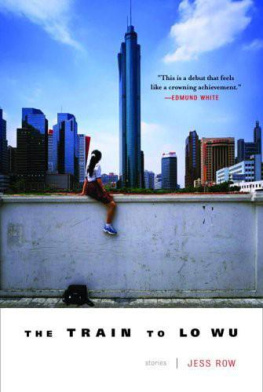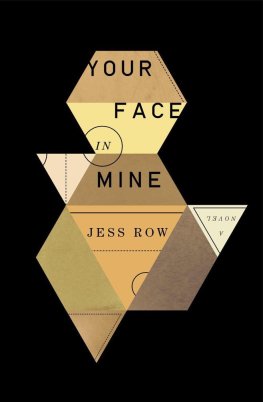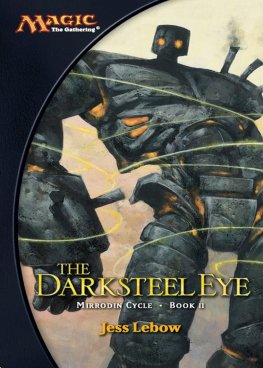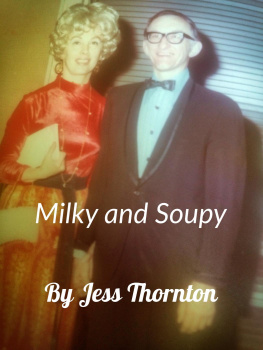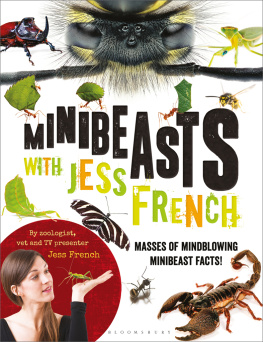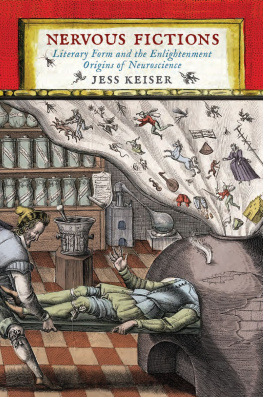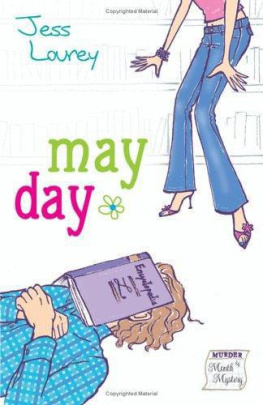Jess Row - The Train to Lo Wu
Here you can read online Jess Row - The Train to Lo Wu full text of the book (entire story) in english for free. Download pdf and epub, get meaning, cover and reviews about this ebook. year: 2006, publisher: Dial Press Trade Paperback, genre: Art. Description of the work, (preface) as well as reviews are available. Best literature library LitArk.com created for fans of good reading and offers a wide selection of genres:
Romance novel
Science fiction
Adventure
Detective
Science
History
Home and family
Prose
Art
Politics
Computer
Non-fiction
Religion
Business
Children
Humor
Choose a favorite category and find really read worthwhile books. Enjoy immersion in the world of imagination, feel the emotions of the characters or learn something new for yourself, make an fascinating discovery.
The Train to Lo Wu: summary, description and annotation
We offer to read an annotation, description, summary or preface (depends on what the author of the book "The Train to Lo Wu" wrote himself). If you haven't found the necessary information about the book — write in the comments, we will try to find it.
The Train to Lo Wu — read online for free the complete book (whole text) full work
Below is the text of the book, divided by pages. System saving the place of the last page read, allows you to conveniently read the book "The Train to Lo Wu" online for free, without having to search again every time where you left off. Put a bookmark, and you can go to the page where you finished reading at any time.
Font size:
Interval:
Bookmark:
Acknowledgments
This book would not have been possible without the support of the Yale-China Association and the Chinese University of Hong Kong, who made it possible for me to live and work in Hong Kong from 1997 to 1999. Zen Master Dae Kwan (formerly Ven. Hyang Um Sunim) and the sangha of the Su Bong Zen Monastery provided invaluable support during my time there, as did, in different ways, David Bailey, Caroline Ross, Brian Seibert, Yonnie Kwok, Youru Wang, Mimi Ho, and Bill and Chenghui Watkins. Many thanks, also, to Charles Baxter, Nicholas Delbanco, Peter Ho Davies, and Reginald McKnight, and to Sean Norton, Jennifer Metsker, Aaron Matz, and Melanie Conroy-Goldman. Maybelle Hsueh and Christina Thompson provided vital editorial assistance. Im deeply grateful to Elyse Cheney, my agent, who has worked tirelessly on my behalf, and Susan Kamil, my editor, who has an uncompromising eye and a fierce dedication to literature. My parents, Constance and Clark Row, have been as generous with their support and love as any parents could possibly be. Last, my greatest thanks go to my wife and best friend, Sonya Posmentier, who believed in these stories before I did.
About the Author
Jess Row taught English at the Chinese University of Hong Kong from 1997 to 1999, the two years immediately following the handover of Hong Kong to China. His stories have appeared in The Best American Short Stories 2001 and 2003 and The Pushcart Prize XXVI, and he has received a Whiting Writers Award and a fellowship in fiction from the National Endowment for the Arts. He lives in New York City and teaches at Montclair State University.
The Secrets of Bats
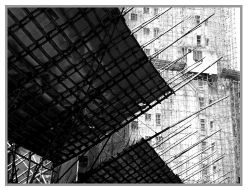
Alice Leung has discovered the secrets of bats: how they see without seeing, how they own darkness, as we own light. She walks the halls with a black headband across her eyes, keening a high Ccheat cheat cheat cheat cheat cheat never once veering off course, as if drawn by an invisible thread. Echolocation, she tells me; its not as difficult as you might think. Now she sees a light around objects when she looks at them, like halos on her retinas from staring at the sun. In her journal she writes, I had a dream that was all in blackness. Tell me howto describe.
It is January: my fifth month in Hong Kong.
In the margin I write, I wish I knew.
After six, when the custodians leave, the school becomes a perfect acoustic chamber; she wanders from the basement laboratories to the basketball courts like a trapped bird looking for a window. She finds my door completely blind, she says, not counting flights or paces. Twisting her head from side to side like Stevie Wonder, she announces her progress: another room mapped, a door, a desk, a globe, detected and identified by its aura.
Youll hurt yourself, I tell her. Ive had nightmares: her foot missing the edge of a step, the dry crack of a leg breaking. Try it without the blindfold, I say. That way you can check yourself.
Her mouth wrinkles. This not important, she says. This only practice.
Practice for what, I want to ask. All the more reason you have to be careful.
You keep saying, she says, grabbing a piece of chalk. E-x-p-e-r-i-m-e-n-t, she writes on the blackboard, digging it in until it squeals.
Thats right. Sometimes experiments fail.
Sometimes, she repeats. She eyes me suspiciously, as if I invented the word.
Go home, I tell her. She turns her pager off and leaves it in her locker; sometimes police appear at the school gate, shouting her name. Somebody, it seems, wants her back.
In the doorway she whirls, flipping her hair out of her eyes. Ten days more, she says. You listen. Maybe then you see why.
The name of the school is Po Sing Uk: a five-story concrete block, cracked and eroded by dirty rain, shoulder-to-shoulder with the tenements and garment factories of Cheung Sha Wan. No air-conditioning and no heat; in September I shouted to be heard over a giant fan, and now, in January, I teach in a winter jacket. When it rains, mildew spiderwebs across the ceiling of my classroom. Schoolgirls in white jumpers crowd into the room forty at a time, falling asleep over their textbooks, making furtive calls on mobile phones, scribbling notes to each other on pink Hello Kitty paper. If I call on one who hasnt raised her hand, she folds her arms across her chest and stares at the floor, and the room falls silent, as if by a secret signal. There is nothing more terrifying, Ive found, than the echo of your own voice: who are you? It answers: what are you doing here?
Ive come to see my life as a radiating circle of improbabilities that grow from each other, like ripples in water around a dropped stone. That I became a high school English teacher, that I work in another country, that I live in Hong Kong. That a city can be a mirage, hovering above the ground: skyscrapers built on mountainsides, islands swallowed in fog for days. That a language can have no tenses or articles, with seven different ways of saying the same syllable. That my best student stares at the blackboard only when I erase it.
She stayed behind on the first day of class: a tall girl with a narrow face, pinched around the mouth, her cheeks pitted with acne scars. Like most of my sixteen-year-olds she looked twelve, in a baggy uniform that hung to her knees like a sack. The others streamed past her without looking up, as if she were a boulder in the current; she stared down at my desk with a fierce vacancy, as if looking itself was an act of will.
How do you think about bats?
Bats?
She joined her hands at the wrist and fluttered them at me.
People are afraid of them, I said. I think theyre very interesting.
Why? she said. Why very interesting?
Because they live in the dark, I said. We think of them as being blind, but they arent blind. They have a way of seeing, with sound wavesjust like we see with light.
Yes, she said. I know this. Her body swayed slightly, in an imaginary breeze.
Are you interested in bats?
I am interest, she said. I want to know how She made a face Id already come to recognize: I know how to say it in Chinese when one bat sees the other. The feeling.
You mean how one bat recognizes another?
Yesrecognize.
Thats a good idea, I said. You can keep a journal about what you find. Write something in it every day.
She nodded vehemently, as if shed already thought of that.
There are books on bat behavior that will tell you
Not in books. She covered her eyes with one hand and walked forward until her hip brushed the side of my desk, then turned away, at a right angle. Like this, she said. There is a sound. I want to find the sound.
18 September
First hit tuning fork. Sing one octave higher: A B C. This is best way.
Drink water or lips get dry.
I must have eyes totally closed. No light!!! So some kindof blacklike clothis good.
Start singing. First to the closest wallsing and listen.Practice ten times, 20 times. IMPORTANT: can notmove until I HEAR the wall. Take step back, onetime, two time. Listen again. I have to hearDIFFERENCE first, then move.
Then take turn, ninety degrees left.
Then turn, one hundred eighty degrees left. Feel positionwith feet. Feet very importantthey are wings!!!
I dont know what this is, I told her the next day, opening the journal and pushing it across the desk. Can you help me?
I tell you already, she said. She hunched her shoulders so that her head seemed to rest on them, spreading her elbows to either side. It is like a test.
Next pageFont size:
Interval:
Bookmark:
Similar books «The Train to Lo Wu»
Look at similar books to The Train to Lo Wu. We have selected literature similar in name and meaning in the hope of providing readers with more options to find new, interesting, not yet read works.
Discussion, reviews of the book The Train to Lo Wu and just readers' own opinions. Leave your comments, write what you think about the work, its meaning or the main characters. Specify what exactly you liked and what you didn't like, and why you think so.

